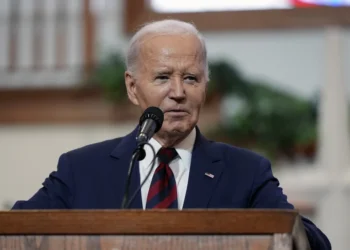Conventional wisdom says the 2028 Republican nomination for president is a lock: Vice President JD Vance will carry the MAGA torch into the GOP’s post-Trump era.
The Washington Examiner’s Byron York reported last week that Sen. Jim Banks (R-IN), a longtime advocate of Vance, said that he “will be the nominee in 2028 — mark my words.”
He added, “After President Trump, [Vance] is the next best thing.”
But declaring Vance the nominee 32 months before the Iowa caucuses is premature. There are indeed compelling reasons to believe that Vance is the favorite as of now, but also clear obstacles that complicate his path to the 2028 GOP nomination.
Far from a done deal, the GOP race for 2028 is wide open.
Vance’s strengths
As of May 2025, the fundamentals look good for Vance from 30,000 feet.
History shows that a winning GOP primary campaign should hope to garner at least 45% of the primary electorate. That number, earned by President Donald Trump in 2016, marks the lowest total won during a contested primary of the past 50 years.
According to an Economist/YouGov survey conducted between May 9-12, Vance is viewed favorably by 77% of Republicans, with 51% viewing Vance “very favorably.”
Crucially, Vance is viewed as a Trump loyalist, and in turn, the MAGA base — which is now the GOP base — appears loyal to him. Vance has embraced Trump’s worldview and style wholesale. And thus far, their political partnership has been harmonious, with little daylight appearing between the two in public.
The only potential moment of incongruity came when the infamous Signal chat emerged, in which Vance had criticized the strikes in Yemen, saying, “I think we are making a mistake,” and that, “I am not sure the president is aware how inconsistent this is with his message on Europe right now.” White House deputy chief of staff Stephen Miller was seen as putting the vice president in his place, writing, “As I heard it, the president was clear.”
But for the MAGA base’s most prominent influencers, the incident only deepened their affection for Vance, who they view as a bulwark against neoconservative influence within the administration.
Vance’s support among these influencers cannot be overstated. Speaking at a recent Heritage Foundation event, Tucker Carlson described Vance as “the future. Period. … JD Vance is the best I’ve ever met. He’s the combination of intelligence, decency, wisdom, emotional self-control.” The influential MAGA darling Laura Loomer, a fervent Vance supporter, recently predicted a Vance-Trump Jr. ticket for 2028. And far-right influencer Jack Posobiec of Pizzagate fame frequently refers to Vance as “48” and sells T-shirts with Vance’s face on them. (Vance appears to return the affection, having blurbed Posobiec’s latest book.)
The large, engaged audiences of new-Right media figures like Carlson and Posobiec make their endorsements critical in GOP primaries.
Vance is also a media machine unto himself. Since stepping onto the national stage last year, no Republican figure, including Trump, has delivered more powerful media moments than Vance. His rebuke of CBS News’s Margaret Brennan, which included the now famous quip, “I don’t really care, Margaret” in response to her criticism of the Trump administration’s pause of the U.S. Refugee Admissions Program, went super-viral on X and drew over 1.7 million views on YouTube within 24 hours.
The moment contributed to Vance’s exceptional “memeability” — a powerful attribute in the social media age. His often blunt and polarizing sound bites are the perfect online fodder for a highly engaged MAGA base, deepening his bond with the voters he needs to secure the nomination.
Importantly, Vance’s reputation as a skilled debater cements his frontrunner status in a process heavily influenced by debates. Though his debate resume is limited — the only two of his short political career are his 2022 Senate debate with former Ohio Democratic Rep. Tim Ryan and 2024 vice presidential debate against Minnesota Gov. Tim Walz — his commanding performances in both suggest a mastery of the format. His showing against Walz impressed so much that commentators speculated at the time that the field for 2028 might already be cleared.
Causes for concern
For all of these formidable strengths, a potential Vance campaign faces significant obstacles. Vice presidents generally have had a difficult time securing their party’s nomination, and even more trouble winning the presidency. Not counting former Vice President Kamala Harris, who was given the nomination without a vote, and former President Joe Biden, whose run came four years after leaving office, only three sitting vice presidents have become their party’s subsequent standard-bearer in the past 50 years: Walter Mondale, George H.W. Bush, and Al Gore — a group that only produced one general election winner.
The reasons vice presidents struggle here are manifold. For one, they are saddled with the record and popular approval of the outgoing president, and in the modern era, administrations tend to end with a whimper, not a bang. One notable exception is former President Bill Clinton, who, aided by an overzealous impeachment effort by Republicans and a resilient economy, saw his popularity rise in the waning days of his presidency. This aided Gore’s effort to fend off a strong primary challenge from Bill Bradley. The electorate, including primary voters, is often hungry for change after two full terms of a presidency. George H.W. Bush’s successful bid following his stint as Ronald Reagan’s vice president, is the exception, not the rule.
Whether Trump’s second term will end on a soaring note or a nadir will largely be determined by the state of the economy. The tumultuous nature of Trump’s tariff war makes it difficult to forecast. Vance’s fortunes will be tied to the trade war’s outcomes, and perhaps explicitly with whispers that Trump is considering Vance to become the administration’s “tariff czar.” Such an appointment would carry the ultimate boom or bust potential for a 2028 run at the White House.
Numerous other unknowns color the coming primary battle. While Vance appears to have support of the extremely loyal MAGA base, there is plenty of time for Trump and Vance’s relationship to go south. Trump has thus far avoided the highly-publicized breakups with senior officials that plagued his first term, but it is early yet.
Vance accusing Trump of ignorance in the Signal chat is an isolated incident insofar as we know. History shows that it doesn’t take much for a Trump insider to become a Trump pariah.
To be sure, Vance’s standing within the MAGA movement remains entirely in Trump’s hands. It is inconceivable that anyone of whom Trump disapproves could win the 2028 nomination. Friction could emerge between the two on numerous issues. Trump’s openness to an Iran strike, for instance, contrasts sharply with Vance’s stated position. It’s difficult to imagine Vance remaining silent in the event of a strike on Tehran, let alone adopting the administration’s position.
The issue of life is another area for potential disagreement. Since being tapped as Trump’s vice president, Vance, once a stalwart anti-abortion senator, has adapted his views on access to mifepristone and a national abortion ban. But the heat of a primary, which will include pro-life challengers, could force him to break with the president and cause a potential rift.
So far, Vance appears to enjoy broad support among the pro-life movement’s leaders despite renouncing his pro-life stances. Vance’s active promotion of in vitro fertilization, a position that conflicts sharply with the Catholic Church and the broader pro-life movement, could also open the door for a pro-life primary challenger to siphon off votes.
Vance’s relative youth and political inexperience also raise questions about his inevitability. Vance, whose national political career is only a few years old, has only run two races, both against deeply flawed opponents: Ryan and Harris-Walz. A primary battle against a Republican heavyweight — such as Secretary of State Marco Rubio or Virginia Gov. Glenn Youngkin — would easily be his most difficult political test. It’s unclear how Vance would hold up during the lengthy primary process against robust competition.
Vance’s brand of politics is another area of concern. His obvious intellectual capabilities draw rave reviews from the post-liberal intelligentsia. But his severe demeanor, seen in intense exchanges on social media and in interviews with mainstream journalists, may alienate voters beyond his online base.
An indispensable aspect of Trump’s political effectiveness is his sense of humor and ability to connect with ordinary people. For every rage-filled, all-caps Truth Social post there’s a genuinely hilarious joke at a MAGA rally or a photo shoot hanging from a McDonald’s window. Vance has not demonstrated the ability to shift gears in this way. It’s one thing to be an impressive intellect and another altogether to be liked. People like Trump. The jury is still out on Vance.
It’s also unclear what will become of the GOP primary electorate post-Trump. Will MAGA factionalize once its founding father steps off the stage? Will Vance’s high unfavorable ratings — as of today, the RealClearPolitics polling average has Vance’s approval rating at 42% and his disapproval at 45% — enable a primary opponent to credibly argue that he isn’t the party’s best general election nominee? Would the prospect of Alexandria Ocasio-Cortez as president worry enough primary voters to take this concern seriously?
Trump himself believes the race is wide open as of today.
DONALD TRUMP JR. SAYS ‘MAYBE ONE DAY’ HE’LL RUN FOR PRESIDENT
“You look at Marco, you look at JD Vance, who’s fantastic,” Trump told Kristen Welker recently on Meet the Press. “You look at — I could name 10, 15, 20 people right now just sitting here.”
Vance is likely the frontrunner as of now, but with years of uncertainty ahead, Banks’s prediction is premature. The 2028 GOP primary is wide open and many plot twists await between now and Super Tuesday — mark my words.

















